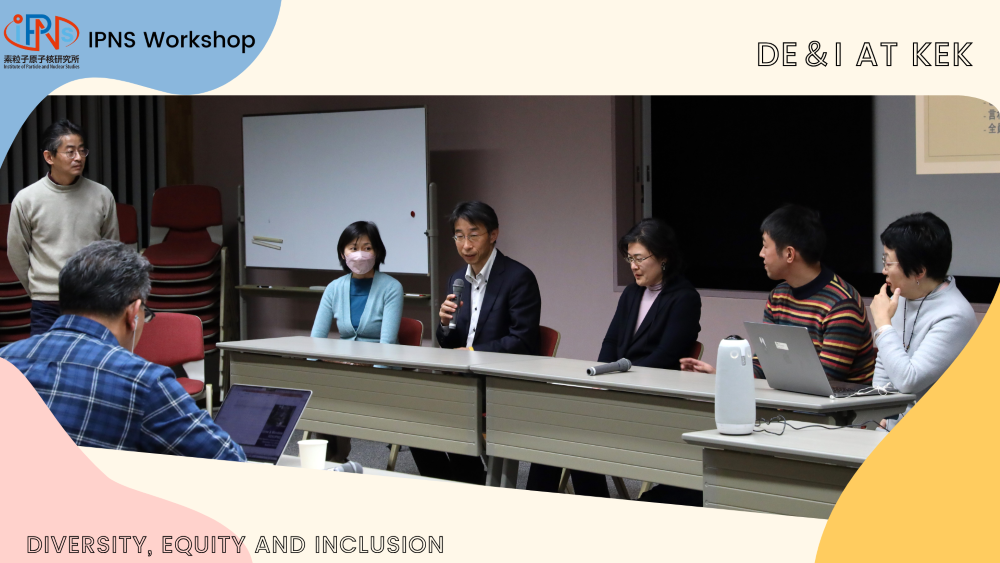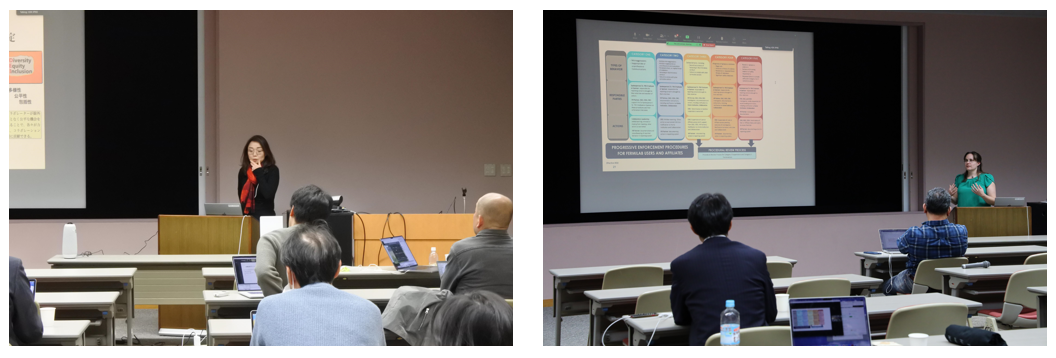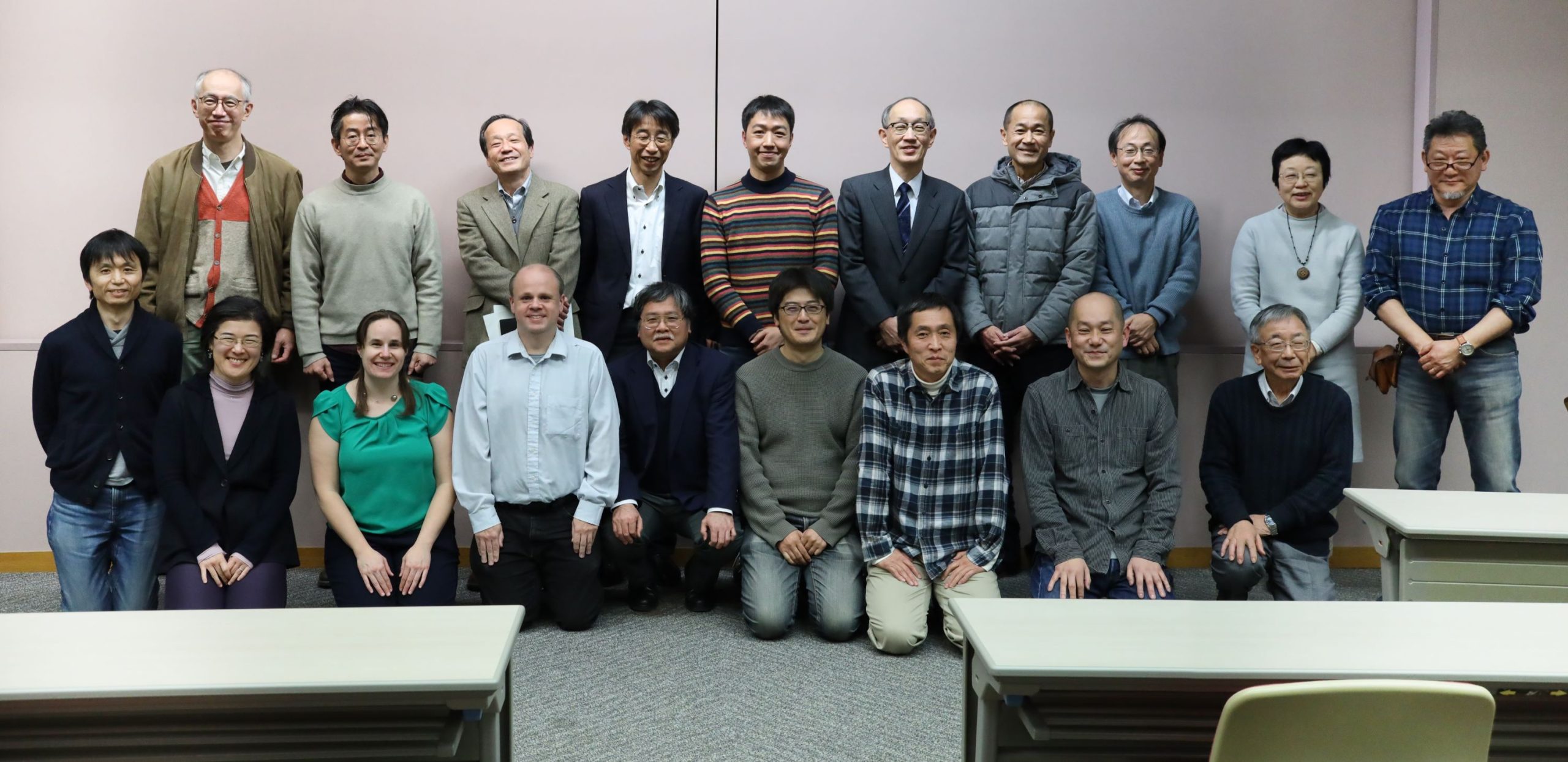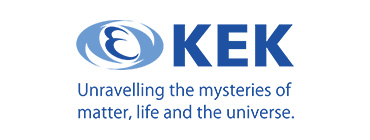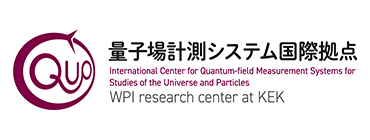- Topics
[IPNS Workshop] Report on “Diversity, Equity, and Inclusion at KEK”
January 23rd, 2024
The IPNS workshop, “DE&I at KEK” took place at KEK Tsukuba Campus on December 5, 2023, attracting over 80 participants in-person and online from Japan and abroad.
In recent years, there has been a growing emphasis domestically and internationally on creating a society with diversity, equity, and inclusion (DE&I). The Institute of Particle and Nuclear Studies (IPNS) also needs to take action from the perspective of DE&I. Compared to foreign countries, there are exceptionally few female researchers in Japan, and it has been pointed out that this is due to issues of harassment, bias, and poor work-life balance. In KEK, young researchers also have requests regarding the balance between work and life. In addition, some experiments involve many foreign researchers, and mutual understanding among researchers with different cultural backgrounds is indispensable. To cultivate the next generation of globally active researchers, it is necessary to raise awareness of bias, discrimination, and harassment while creating an inclusive education and research environment.
At this workshop, we had various talks focusing on the issues of gender equality, work-life balance, and KEK’s position as a host for domestic and international research, and the efforts of other international research institutes and experimental groups. Participants shared insights from diverse perspectives and had a lively discussion. As this was the first full-scale DE&I workshop at the IPNS, we report on its contents in detail.
Why is Diversity, Equity, and Inclusion Important?
Dr. Mihoko Nojiri, KEK gender equality promoter, cited a survey of researchers at universities across Japan and data from the Physical Society of Japan, showing that about half of female researchers feel they have experienced bias and harassment. They are facing challenges and leaving the field at a higher rate than male researchers, and the gap increases when they face issues of work-life balance. Young researchers, regardless of gender, also struggle with work-life balance. While societal consensus on the necessity of diverse perspectives is growing, we need more systematic efforts to raise awareness among researchers to achieve the diversity and inclusion goal. She also noted a notable decline in female students’ interest in science and mathematics during the transition from elementary to junior high school in Japan, highlighting the necessity of acting against stereotypes in elementary education and the contribution of KEK to career education.
Towards Accepting Different Values
Kazunori Hanagaki, Deputy Director of IPNS, pointed out that the expanding trend of diversity comes in line with globalization and evolving times.He emphasized the importance of dialogue to understand each other’s perspective to share research and achieve results, especially when working with colleagues with different values and cultural backgrounds. For example, different countries have different attitudes about implementing rules. Another example is Japan’s unique and robust peer pressure, a stumbling block for globalization. While it might not be possible to accept all different viewpoints, trying to overcome these differences is necessary. Dr. Hanagaki also stressed the need to deepen understanding and share perspectives, even if only partially, which received sympathy from other participants.
Diversity and Inclusion at IMSS
Nobuhiro Kosugi, Director of the Institute for Materials Structure Science (IMSS) at KEK, introduced IMSS’s activities on Diversity and Inclusion. IMSS provides quantum beams such as synchrotron radiation, positrons, neutrons and muons, and IMSS researchers, together with co-users and collaborators, conduct comprehensive research on the structure and function of materials on a wide range of scales from the atomic to macromolecular and biomolecular levels. Most IMSS researchers are assigned to one of the more than 60 of different types of public beamline instruments. With no replacement personnel available, some of them face the difficulty of dealing with users, including working night shifts and weekends and balancing work with their own research. The stress test results revealed a lack of communication between members of the same generation due to the vertically divided equipment support system. Specific measures are being considered to relieve such stress and create an environment where employees can demonstrate their individuality and competence.
Childcare Leave Experience at KEK
Another speaker, Dr. Norifumi Yamada, who is the first male faculty taking childcare leave in KEK, also shared his experience. He pointed out the difficulties in maintaining beamlines and continuing research even when using the childcare leave system of KEK, and emphasized the need for a flexible system tailored to each individual’s circumstances based on their experience during the leave. He also stressed that women’s advancement in society is one of the crucial aspects of promoting diversity, and that it is linked inseparably to the problem of childcare burdens. The solution is not only to improve the design of the system but also to make sure that everyone thinks about this problem as their own.
Diversity and Inclusion at KEK from the Viewpoint of a Foreign Researcher
Dr. Karim Trabelsi (Toshiko-Yuasa-Lab), the spokesperson of the Belle II Collaboration, spoke about issues related to internationalization based on his experience working as a permanent staff member of KEK from 2006 to 2018. The environment for visiting foreign researchers has greatly improved by developing a system that supports users staying at KEK; however, challenges for foreign researchers permanently based at KEK to efficiently work as independent researchers still need to be improved. Japanese language skills are required to communicate with domestic service providers, and it is challenging to expand the involvement of non-Japanese researchers in that area. Other than that, he pointed out that foreign researchers need to be informed about rules, obligations, and opportunities without asking for support from their colleagues. More communication between non-Japanese KEK members and management is required to fulfill the demand for the goal of diversity.
DE&I Initiatives in International Collaborations
Dr. Tsuyoshi Nakaya (Kyoto University), a former spokesperson of the T2K collaboration, and Dr. Kendall Mahn (University of Michigan), the current co-spokesperson, introduced the experiment’s efforts against harassment. Dr. Nakaya said that severe harassment cases in another international experimental collaboration had led to the departure of an outstanding researcher from the group. This lesson was taken seriously by the T2K collaboration and led to the experiment taking robust action against harassment. Collaborations for particle physics experiments are often complex organizations involving researchers from different institutions, and they do not have good legal mechanisms to address serious cases of misconduct. Dr. Mahn stressed that the US national labs such as Fermilab, are starting to provide structures which support collaborations to handle serious cases.
Dr. Yasuyuki Okumura (University of Tokyo) and Dr. Emi Koh (IJCLab) shared their experiences regarding initiatives at the ATLAS experiment, the European Organization for Nuclear Research (CERN) and the Belle II experiment. Dr. Okumura introduced various initiatives at CERN, such as establishing a fair, neutral, and expert “CERN ombud” to provide impartial advice and guidance according to the CERN Code of Conduct and “D&I Round Table” as a forum for sharing information and discussing across experiments and departments within CERN. The CERN case will be helpful to consider a similar system at KEK. Dr. Koh emphasized that the Belle II Collaboration annually surveys the number of talks allocated to female researchers and the percentage of women in management, and the results are reported and shared at the Collaboration meetings, contributing to transparency and awareness within the collaboration.
Report from the IPNS CoC drafting Working Group
A code of conduct (CoC) is a statement of how members of an organization or community should behave and is an important guideline for working efficiently towards a common goal while respecting each other. To establish a new code of conduct at IPNS a “CoC drafting working group” was launched in August of this year. Dr. Hiroyuki Nakayama, Chair of the CoC drafting Working Group, explained the draft of the Code of Conduct. The draft was created based on a survey of CoC’s and related activities of other domestic and international research institutes and private companies, as well as a survey on gender equality promotion at KEK. The five principles of “intellectual integrity,” “transparency,” “respect for diversity, equity, and inclusion,” “fostering the next generation,” and “safety” are outlined in the code. The content of the code is being reviewed while listening to a wide range of opinions from various stakeholders.
Panel Discussion
In the panel discussion, moderated by Yutaka Ushiroda, Deputy Director of IPNS, Dr. Shima Shimizu and Dr. Hiromi Iinuma (Ibaraki University) were joined by Dr. Nojiri, Dr. Nakaya, and Dr. Nakayama.
The significant gender gap in the number of male and female researchers in Japan has not yet been improved, making it one of the most pressing issues requiring sincere attention to diversity. Initially, the panelists discussed improvements needed in the future from the viewpoint of female researchers based on their experiences in childcare, confirming the importance of the pivotal role of support and understanding in sustaining researchers’ continuous engagement. Dr. Nakayama added that it was also essential to have the option to work according to individual circumstances. Dr. Nakaya pointed out that Japanese people are ingrained with the belief of “not causing trouble to others“ from a young age. On the other hand, people around them want to help those in need. He stressed the importance of workplace communication and sharing personal situations that individuals are facing. During that discussion, Dr. Iinuma expressed her concerns that she is the only faculty member taking care of the students in her group, and she also said that maintaining regular dialogue helps to avoid instances where actions or words might be perceived as harassment. There were comments from participants expressing gratitude for having the space to take care of children in the workplace and for the support from a leader, encouraging parental leave for childcare. During the discussion, the panelists also confirmed the importance of publicizing such experiences.
Dr. Nakaya emphasized the necessity of sharing information between collaborations hosted by KEK and KEK itself as an expectation from international collaborations. Additionally, he highlighted useful mechanisms to gather opinions from small-scale experimental groups and students. Commenting on taking leave, Dr. Ushiroda noted, “Some participants initially hesitated to take leave for reasons like childcare but found they could overcome these concerns with support from their surroundings when they requested time off. Taking a break is essential for sustainable work and supports women’s careers. At IPNS, we aim to provide flexible support to encourage this.”
To make the utmost use of the IPNS CoC, Dr. Nojiri stressed the importance of creating a system to implement the CoC and the need to gather the “voices” from members and users to accelerate the efforts.
Naohito Saito, Director of IPNS, said “To address concerns from our members, I’d like to start with the establishment of a “suggestion box” system where members can anonymously submit their feedback to the IPNS Director’s Office. Furthermore, we need to prepare training and workshops conducted by experts on how to address and handle the received feedback and concerns.”
Junji Haba, an Executive Director of KEK, concluded that KEK would thoroughly consider revising its Code of Conduct and expanding the framework for diversity based on the input from this workshop. He also pointed out the importance of paying more attention to the users’ needs as an inter-university research institute cooperation.


